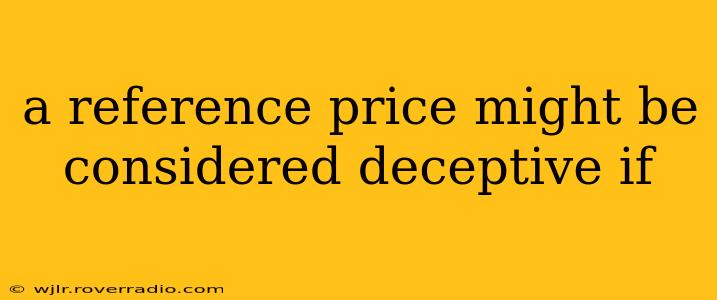A reference price, also known as a comparison price, is a price shown alongside a product's current selling price to suggest a saving or discount. While a helpful tool for consumers, a misleading reference price can be deceptive and even illegal, depending on the jurisdiction. This post will explore various scenarios where a reference price might be considered deceptive, focusing on the ethical and legal implications.
What Makes a Reference Price Deceptive?
A reference price becomes deceptive when it doesn't accurately reflect the actual price a consumer would reasonably expect to pay for the product. This means the "original" or "regular" price is artificially inflated, creating a false impression of a significant discount. Deceptive reference pricing aims to manipulate consumer purchasing behavior through misrepresentation.
How Can Retailers Manipulate Reference Prices?
Retailers might employ various tactics to make reference prices deceptive:
- Inflated "Regular" Price: The most common tactic is setting a falsely high "regular" price. This "regular" price might be one the product has rarely, if ever, sold for.
- Fictitious "Regular" Price: The retailer may invent a "regular" price that has never existed.
- Short-lived Sale Price: A product might be briefly marked at a high price, then immediately "discounted," creating a false sense of urgency and a substantial saving.
- Misrepresenting the Reference Period: The retailer may inaccurately represent when the "regular" price was in effect. For example, claiming a product was regularly $100 when the last time it was sold at that price was months ago.
- Combining Discounts: Listing multiple discounts (e.g., a percentage off and a further amount off) can make the real saving unclear and potentially deceptive.
What Are Some Examples of Deceptive Reference Pricing?
Consider these scenarios:
- A new product is listed with a high "regular" price, immediately "discounted" by 50%. The product has never sold for the higher price.
- A store displays a reference price that was only valid for a very short period of time in the past. Consumers are led to believe the "regular" price is more common than it is.
- A website shows a series of discounts stacked on top of each other, making it hard to track the genuine reduction. The cumulative impact of the discounts is obscured.
Is a Reference Price Always Deceptive?
No. A reference price is perfectly legitimate if it accurately reflects the usual retail price of the item at the same store or similar stores within a reasonable recent period. Transparency is crucial; the retailer should be able to justify the reference price used.
What Legal Ramifications Exist for Using a Deceptive Reference Price?
Depending on the location, using a deceptive reference price can lead to legal penalties, including fines and legal action. Consumer protection laws in many countries prohibit unfair trade practices, including misleading advertising and pricing. Regulatory bodies often investigate complaints about deceptive reference pricing.
How Can Consumers Avoid Being Fooled by Deceptive Reference Prices?
- Research the product: Check prices from multiple retailers before purchasing.
- Be wary of unusually large discounts: Extreme discounts should raise suspicion.
- Look for reviews: See what other consumers are saying about the product and its pricing.
- Report suspicious practices: If you believe a reference price is deceptive, report it to the relevant consumer protection authority.
This article aims to provide a comprehensive overview of deceptive reference pricing. Understanding the tactics used and the legal ramifications is essential for both consumers and businesses. Remember that transparency and honesty are key to fair and ethical pricing practices.
